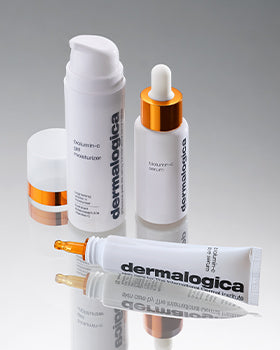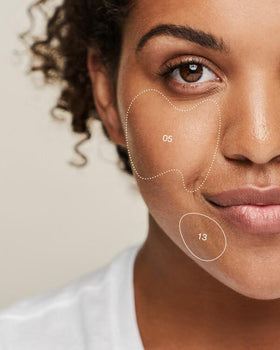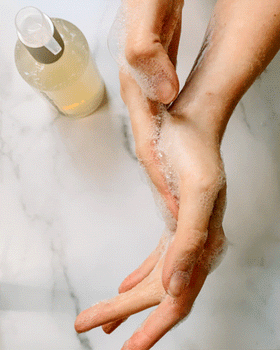Spring is an exciting time of year, the weather is warming up, the days are finally getting a little longer and we all have high hopes that summer is just around the corner. It’s no surprise that an increase in temperature, humidity and sun exposure can wreak havoc on our skin, causing common skin issues such as eczema, psoriasis, hay-fever, acne and rosacea to flare due to these environmental changes.
Let’s take a look at some of these common skin issues in more detail.
Eczema
Atopic dermatitis (eczema) is a skin condition that can affect any age, it presents as red, itchy areas on the skin and is common in places on the body such as the eyelids, arms and behind the knees. Springtime can be a little hit and miss for eczema sufferers, whilst some will see their symptoms improve due to more moisture being in the air, others will find that the increase in seasonal pollen can be a trigger for a flare up, alongside hay-fever.
Whilst there is no specific cure for eczema, symptoms can be managed with self-care measures to prevent outbreaks. We recommend to avoid sitting on grass or touching shrubs/bushes which could aggravate eczema, to avoid harsh soaps and exfoliants and to keep skin as hydrated as possible.
Using a body lotion daily all over the skin, such as our Body Hydrating Cream, will help to provide the skin with lightweight hydration, smooth the skin and relieve dryness. If you have specific areas of eczema that require a little more care, opt for our Barrier Repair - this provides a barrier over the skin, to help the damaged skin underneath to heal whilst thoroughly calming and hydrating.
Psoriasis
Psoriasis is a skin disease that causes red, itchy, scaly patches, most commonly on the knees, elbows, trunk and scalp. Psoriasis is a common, long-term (chronic) disease with no cure. It tends to go through cycles, flaring for a few weeks or months, then subsiding for a while or going into remission.
Spring is often a season looked forward to by psoriasis sufferers. Warmer weather and more moisture in the air can often help to relieve itching and sunshine helps to improve the overall skin condition. Even though this time of year is gentler on psoriasis, it's important precautions are taken.
If you have psoriasis, daily sun exposure can help relieve symptoms by slowing down growth and shedding. Whilst sunlight can be beneficial, ensure you are wearing a broad-spectrum sunscreen whenever you are heading outside to avoid any damage to the skin. A daily sunscreen such as Protection 50 Sport SPF50 can be applied all over the body, including the face and provides protection from both UVA and UVB rays, better yet it's water-resistant for up to 80 minutes!
As psoriasis is often dry and scaly, it's important to keep up with moisturiser daily. Skin Smoothing Cream is a mid-weight moisturiser which infuses the skin with 48-hours of continuous hydration and protects against environmental stress.
Other essentials when dealing with psoriasis include, wearing loose clothing to avoid irritation, minimising stress and anxiety which can worsen symptoms and limiting alcohol and caffeine intake which can cause flare ups.
Hay-fever
Hay-fever is a common name to describe allergic rhinitis. It is an inappropriate immune response to allergens in our environment and is usually triggered by wind-borne pollen from trees, grass and weeds. Symptoms include, a stuffy and/or runny nose, frequent throat- clearing, red lower eyelids, watering eyes, breathing through the mouth, bouts of sneezing and repeated nose bleeds just to name a few!
When dealing with hay-fever, it is useful to be aware of your triggers and how best to avoid them. During Spring, it can be difficult to avoid pollen, however you can avoid going outside when pollen counts are high. The amount of pollen in the air is at it’s highest in the morning, on windy days and after a thunderstorm.
Saline washes and decongestant nasal sprays seem to be the most effective at unblocking the nose, however it can leave your nose and surrounding areas of skin feeling raw and uncomfortable. This is where Barrier Repair comes in, apply to the nose and surrounding areas of skin to help protect it from environmental factors and enable healing. Another recommendation would be to use a gentle cleanser over the area such a UltraCalming Cleanser which can be applied then gently removed with a cotton pad - no need for water if this makes your skin even more uncomfortable.
Acne
During Springtime, the temperature is rising and so are the humidity levels, this can cause the skin to both sweat, and produce more oil. Sweat and oil can then clog pores and lead to more breakouts. Acne can occur anywhere on the face, and during the warmer months don’t be surprised if breakouts start popping up in other places such as the back, chest, and buttocks.
This seasonal change is the perfect time to re-look at your current skincare routine and give it a refresh. Those products that may have worked for you in cooler, dryer climates may have a different effect in warmer, humid climates.
When dealing with acne through spring, it is important to avoid using skincare products that contain oil and are too heavy for the skin, we recommend Active Moist or Cooling Aqua Jelly moisturisers for oil-free options. Another great way to help reduce acne flare ups is to take supplements such as Omega 3, Omega 6 and Alpha Lipoic Acid to help with skin moisture. Also take a look at ingredients in your current daily cleanser and ensure its specifically designed for oily or breakout prone skin, it could be worth switching up your cleanser for one that contains Salicylic Acid such as Clearing Skin Wash, this is going to help clear out any unwanted oil, bacteria and sebum from your pores before it can turn into a breakout.
If your acne persists, or if you would like further information on treating acne, please speak to your local Dermalogica Skin Therapist about what changes are recommended for your routine during this season change. A list of our Dermalogica skin centres can be found here.
Rosacea
Rosacea is a common skin condition that causes redness, usually persistent in the central areas on the face resulting in small blood vessels on the nose and cheeks becoming more visible. Many people with rosacea may also experience red, puss-filled bumps, especially if they have been dealing with rosacea for a few years.
This time of year can be very difficult for those suffering from Rosacea, increased exposure to the sun and wind, higher temperatures and more time spent outdoors can all trigger rosacea symptoms. It’s important for an individual with rosacea to understand their triggers and how best to avoid them. Please note that the sun’s rays are at their strongest between 10am-4pm, during this time those with rosacea should seek the shade and avoid direct exposure to the sun to limit a flare-up. It is vital to wear an SPF when dealing with rosacea, due to this being a sensitive skin condition, you may find using a physical sunblock such as Invisible Physical Defense the most comfortable for your skin. Ensure you keep the skin hydrated with something lightweight, Calm Water Gel does just that, it’s a watery texture moisturiser which is extremely cooling for the skin, we recommend gently patting this on the area morning and night (or when needed) to help take some heat out of the skin and calm redness.
If you have any questions about your skin or how Dermalogica products can help your skin concerns, please reach out to your local Dermalogica skin centre to book an appointment with a Dermalogica Skin Therapist. Alternatively, please contact us at customerservice@dermalogica.co.nz and we will be happy to help you in any way we can.



